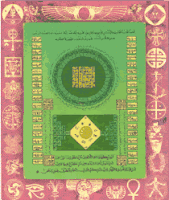It may be mentioned here that in all these charms, spells, and incantations it is necessary to write the name of the mother of the person whom it concerns. If the father's name is inserted instead the charm is abortive. The events related in the following story are, so my informant strongly maintains, perfectly true. In a small village in Upper Egypt there lived a man and his wife, , the latter being very good-looking.
One day a certain kadi 2 who was visiting the village in question saw her, and, falling in love with her on the spot, desired her as his wife. Knowing that she was already married, his only plan was to get rid of her husband, and so he determined to drive the unfortunate man mad. To accomplish this he induced a magician to write a charm on a piece of paper, which he tied to an inner branch high up on a palm-tree, where it could not easily be seen. The reason for his thus tying the charm to a palm-branch is the are blown this way and that in the wind in apparent confusion, so the brain of the man against whom the spell was concocted would be tortured and confused. Possibly the woman's husband got to know what had been done, but anyhow the poor man lost his reason. He tore off his clothes, tied a rope round his waist, and spoke at times in an unknown tongue. " You must say," so he told the village boys who congregated around him, " ' Kee ree bra ra kee ree bru.' " He would also constantly mutter, "Kamaleh [his wife's name] went to the east, Kamaleh went to the east," repeating it over and over again. Finding that he got no better, his wife divorced him, whereupon the kadi asked for her in marriage, and was accepted. Meanwhile, the poor husband wandered aimlessly about, saying that he was king of his native village. He collected bus — dry dura (maize) stalks — each stalk of which he thought was a gun. With these he armed himself and the young lads of the village, and told them that he was their king, and that they must follow him to fight against the the other villages. On the day of the weekly market he would repair to the market-place, seize large pieces of meat hung up for sale, and eat them raw. He would also pounce upon the fish hat the fishermen had caught in the pond adjoining the willage. A last the „omdeh“, or headman, of the village, finding that the poor fellow had become a disturbing element in the place, wrote to headquarters about him, and he was removed to an asylum. Here h died, but up to the last one sensible word he was constantly uttering was his wife's name.
18/11/2011
Donald Trump Through Vedic Astrology: An Egocentric Man Approaching the End
Many people have recently been asking me the same question: Will Donald Trump soon experience a downfall, death, or end up in prison? An an...

-
For a man's penis to be strong and hard, the following signs should be written on a white porcelain plate. After writing the magic sign...
-
There is probably no person who does not know what a talisman or amulet (zapis or hamajlija on Bosnian language), is. It is a short or long...


